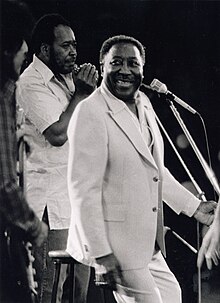| Muddy Waters discography | |
|---|---|
 Muddy Waters with James Cotton in Ontario Place, Toronto (1978) | |
| Studio albums | 13 |
| Live albums | 9+ |
| Compilation albums | 25+ |
| Singles | 62 |
| Singles as accompanist | 20 |
| Albums as accompanist | 17 |
Muddy Waters (1913–1983) was an American blues artist who is considered a pioneer of the electric Chicago blues and a major influence on the development of blues and rock music.[1][2] He popularized several early Delta blues songs, such as "Rollin' and Tumblin'", "Walkin' Blues", and "Baby, Please Don't Go", and recorded songs that went on to become blues standards, including "Hoochie Coochie Man", "Mannish Boy", and "Got My Mojo Working".[3] During his recording career from 1941 to 1981, he recorded primarily for two record companies, Aristocrat/Chess and Blue Sky; they issued 62 singles and 13 studio albums (as with most postwar blues musicians, his recordings were released as two-song singles until the 1960s, when the focus shifted to long-playing albums).[4][5]
While he was living in Mississippi, Waters was recorded by Alan Lomax in 1941 for a U.S. Library of Congress folk music project.[6] Two songs were released on a 78 rpm record, "Country Blues" and "I Be's Troubled".[7] After moving to Chicago, he recorded for Leonard Chess and Aristocrat issued Waters's first single in 1947.[8] In 1950, Chess bought out his label partners and formed Chess Records.[9] From 1950 to 1958, Chess issued 15 singles that reached the top 10 of Billboard magazine's R&B chart.[10] Among the many albums the label released are the influential early compilation The Best of Muddy Waters (1958) and the live At Newport 1960.[11]
After Chess went out of business in 1975,[12] Waters recorded several successful albums for Blue Sky. Produced by blues rock singer and guitarist Johnny Winter,[13] Hard Again (1977), I'm Ready (1978), and Muddy "Mississippi" Waters – Live (1978) won Grammy Awards for "Best Ethnic or Traditional Recordings".[14] As a sideman, Waters also contributed to recordings by Little Walter, Junior Wells, Otis Spann, and others.[4] After Waters's death in 1983, a large number of compilation and live albums have been issued by various record companies,[15][16] often with significant overlap and duplication.[17] The double disc The Anthology: 1947–1972 (2001) is ranked at number 483 on Rolling Stone magazine's 2020 list of the "500 Greatest Albums of All Time".[18]
- ^ Herzhaft 1992, pp. 254–257.
- ^ Palmer, Robert (May 1, 1983). "Muddy Waters, Blues Performer, Dies". The New York Times. Retrieved January 22, 2023.
- ^ Herzhaft 1992, pp. 435–478.
- ^ a b Wight & Rothwell 1991, pp. 26–53.
- ^ Chess 1989, pp. 26–27.
- ^ Gordon 2002, pp. 35–38.
- ^ Wight & Rothwell 1991, p. 37.
- ^ Chess 1989, p. 28.
- ^ Gordon 2002, pp. 100–101.
- ^ Whitburn 1988, p. 435.
- ^ Koda 1996, pp. 269–270.
- ^ Gordon 2002, p. 248.
- ^ Gordon 2002, pp. 255, 257, 262.
- ^ "Grammy Awards History – Muddy Waters". Grammy.com. Retrieved June 19, 2019.
- ^ Gordon 2002, pp. 295–296.
- ^ "Muddy Waters: Discography – Compilations". AllMusic. Retrieved April 6, 2016.
- ^ Dahl 1996, pp. 269–271.
- ^ Rolling Stone (September 22, 2020). "500 Greatest Albums of All Time". Rolling Stone. Retrieved September 23, 2020.
